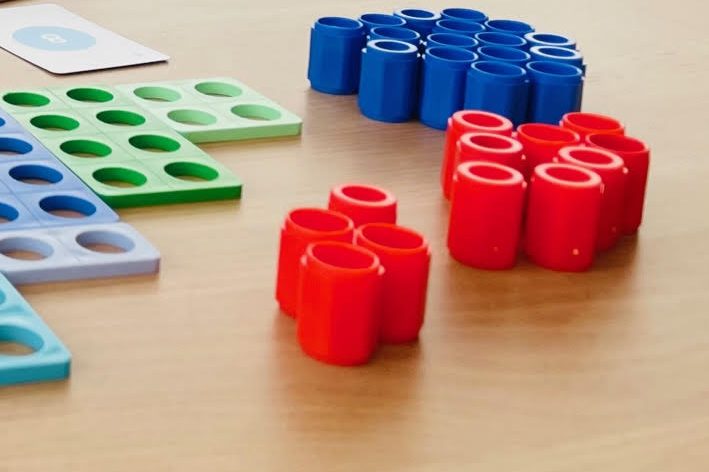TODAY MANY CHILDREN,EVEN ADULTS ALIKE FEEL APPREHENSIVE, TROUBLED AND EVEN DISTRESSED WHEN CONFRONTED WITH A MATHS PROBLEM. MATHS SPECIALIST, ANGELIQUE PODSTAVNYCHY EXPLAINS WHY AND WHAT WE CAN DO TO HELP.
By Angelique Podstavnychy, Maths Specialist
This fear of maths is unfortunately compounded in our society where maths is often labelled as the difficult subject or a subject where it is normal to be “bad” in.This “anti-maths mindset”, coined by UK Prime MinisterRishi Sunak, is on the rise and is negatively impacting children’s numeracy development.
The phenomenon of maths anxiety or a fear of maths is not linked to intelligence or ability. In fact, according to one study, involving children, done by the University of Cambridge found most of those with high maths anxiety scored normal to high results on curriculum maths tests.“Because these children perform well at tests, their maths anxiety is at high risk of going unnoticed by their teachers and parents, who may only look at performance but not at emotional factors,” says Dr Amy DeVine. “But their anxiety may keep these students away from STEM fields for life when in fact they would be perfectly able to perform well in these fields.” Although maths anxiety is not a consequence of academic achievement, the anxiety associated with the condition can affect performance. This can lead to a vicious circle:maths anxiety leading to poorer performance and poorer performance increasing maths anxiety. Further amplifying the belief that maths ability is fixed and cannot be improved, hindering motivation to develop and improve numeracy skills.
- Classrooms are a safe and supportive environment where children can express their thoughts and ask questions. Through our IPC Curriculum a growth mindset is encouraged by highlighting the importance of mistakes being opportunities for learning.
- White Rose Maths is used as our core curriculum for Mathematics teaching. At the heart of their resources and frameworks is the motto “Everyone Can Do Maths: Everyone Can!” — a slogan that we wholeheartedly agree with! Adopting a White Rose Maths approach to teaching means making sure all children have the same opportunities to learn and the support they need to fully grasp concepts.
- Another benefit of White Rose Maths is that their philosophy is focused on making maths fun for children and helping them to find enjoyment in number problems. Because when children are engaged in learning and enjoying maths, that’s when learning really sinks in, and deep learning happens.
- Promotion of active learning whereby children engage with mathematical concepts through hands-on activities, group discussions, and problem-solving exercises. This helps children develop a deeper understanding of the subject matter and builds their confidence.
- Teachers utilize a learning journey approach to encourage self-reflection. By encouraging children to reflect on their own learning metacognitive skills such as self-monitoring and self-regulation are being developed, which can help children develop a sense of control over their mathematical abilities.
- Clear communicate with parents through our Learning Ladder Portal. Parents are informed about their child’s progress, strengths, and areas for improvement. Collaboration with parents creates a supportive learning environment at home as well.
- Additional support provided by Maths Specialist. If a child’s maths anxiety persists despite efforts within the classroom, our maths specialist can provide additional support and intervention.

To build maths confidence in your child you need to talk positively about maths. Children learn from example so avoid saying things such as ” I hated math at school! “or “This maths is difficult.” Children can easily take on an “anti-maths” mindset from statements such as these. Instead keep conversations positive and encouraging as this is more likely to help children develop confidence with maths.
Maths is all around us and not something that only happens at school. Point out maths in in everyday life by showing children the numbers in things like cooking, shopping, travelling and even computer games! These are valuable opportunities to help children see the value of learning maths and understanding its relevance.
It is important to also praise children for effort rather than performance. The type of praise we give children can strongly impact how they feel about maths. Praising children for the hard work they’ve put in, or for working out the steps to get to an answer, is more helpful than simply telling them they’re clever. It helps them see that it’s not about natural ability – but that by working hard they can always improve.
In conclusion, it is important to recognize the importance of addressing maths anxiety early on by encouraging a positive mindset, building self-confidence, and developing a growth mindset that believes in the ability to improve can help combat maths anxiety. Working together as teachers and parents many children can overcome their maths anxiety and develop a positive relationship with mathematics.
Also read Angelique’s article on ‘How to Smah Your Timetables’
